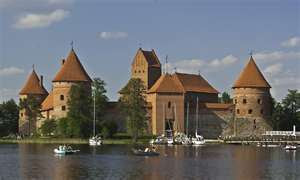Overview:
Lithuania is the largest and most southerly of the three Baltic republics. The country regained its independence during the collapse of the Soviet Union in 1990. The last Russian troops withdrew in 1993. Lithuania subsequently restructured its economy for integration into Western European institutions; it joined both NATO and the EU in the spring of 2004. In 2015, Lithuania joined the euro zone, and it joined the Organization for Economic Cooperation and Development (OECD) in 2018.
American Embassy Vilnius:
The inspection took place from October 8-17, 2001. Another quick inspection of essentially seven workdays. For this inspection I focused on management, human resources and financial management. Joanne Thompson joined the team as the second management inspector and covered facilities and general services. I believe that Joanne did not last long with OIG and this may have been her only overseas inspection. The embassy was well run but as noted below more agency involvement was required with the International Cooperative Administrative Support Services (ICASS) council. The Management Officer was John Gieseke, who had served in the Middle East and you could tell by all the carpets he had in his office. Since there was no American Human Resources Officer there should be a MOU with the Frankfurt Regional Support Center to provide support in this area. I was impressed with the Foreign Service National (FSN) Senior Financial Management Specialist. Her name was Ramune Bieksiene and is still working at the embassy to this day as far as I know.
Findings:
- Establish an interagency working group within ICASS and complete an annual assessment.
- Prepare supporting documentation and request funding to meet embassy space requirements.
- The Regional Support Center in Frankfurt schedule visits to Embassy Vilnius to provide human resources support.
- The embassy should inventory all nonexpendable property in selected residence, assign nonexpendable property application information, and place an entry log at the alarm site to record access, deactivation, and reactivation of the alarm system. Also, respond to open recommendations in the Office of Safety/Health and Environmental Management's April 2000 report to ensure the safety of embassy employees.
- With the the passing of the Government Performance and Results Act the Department mandated that payments be made by Electronic Funds Transfer (EFT). This applied to having Foreign Service National (FSN) salaries deposited to employee bank accounts and in processing payments to local vendors overseas.
- Install the Electronic Certification System hardware and software and coordinate with the Paris Financial Service Center to provide the necessary training to begin transmitting data for payment transactions electronically.
- Ensure that supervisors of sub cashiers perform unannounced cashier verifications on a monthly or quarterly basis as required by regulations.
- Besides visiting the sites below, we attended a concert of classical music in the old hall in the old town.
- Lithuanian food was influenced by Baltic, Russian and German cuisine. Potato dumplings, fried bread, beetroot soup, chilled borscht, mushroom cookies, fried curd cakes and potato pancakes were most traditional dishes.
 |
| Upper Castle on Gediminas Hill, built many centuries ago, |
 |
| The Church of St. Peter and Paul is a masterpiece of Vilnius Baroque. It was built in the 17th century with its wondrous interior decorations of more than 2,000 sculptures and bas-reliefs |












